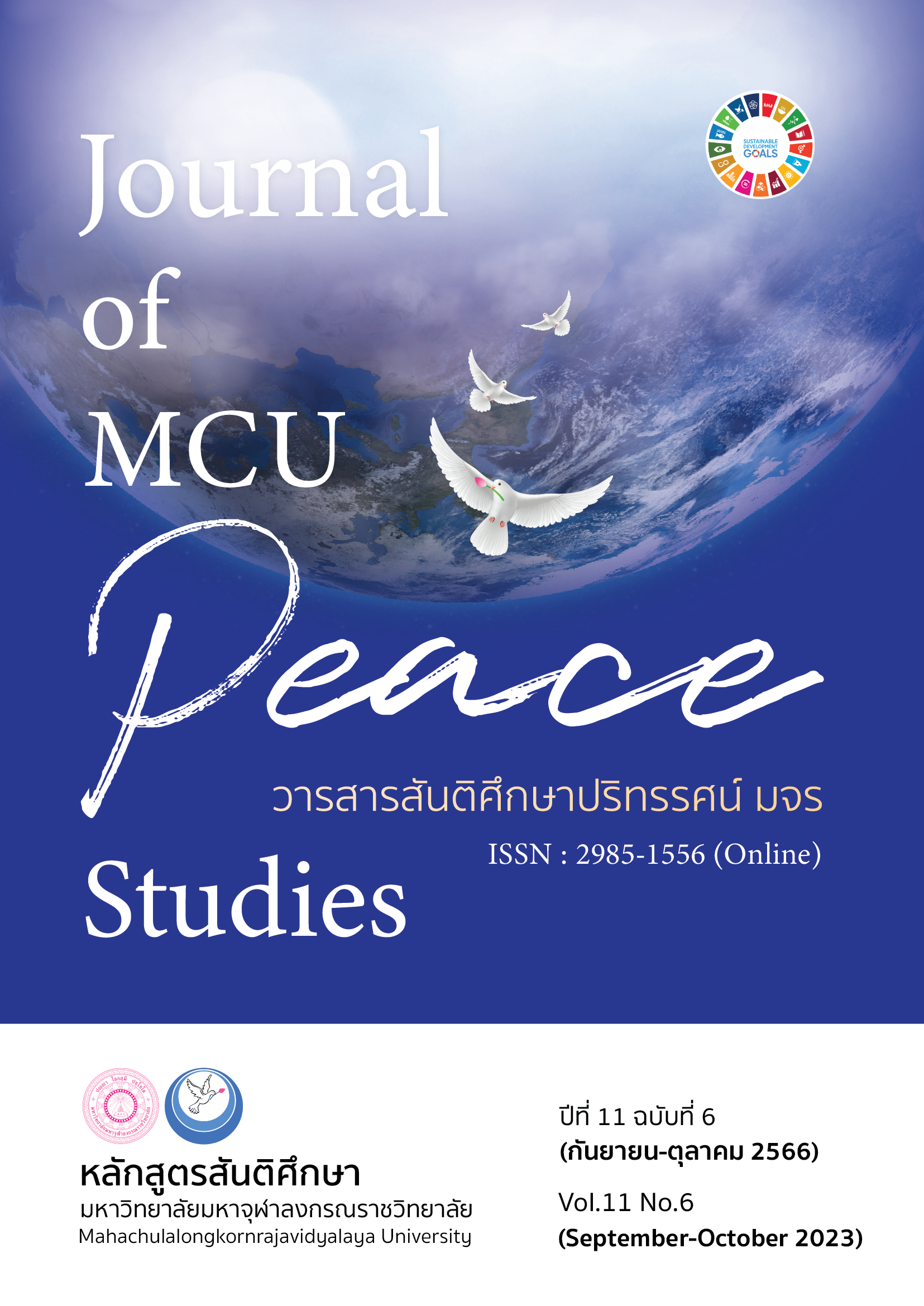แนวทางการพัฒนากลยุทธ์สู่ความสำเร็จการเป็นผู้นำตลาดผลิตภัณฑ์โปรตีนเสริมทางการแพทย์ในประเทศไทย
Main Article Content
บทคัดย่อ
บทความวิจัยนี้มีวัตถุประสงค์ 1) เพื่อศึกษาลักษณะพฤติกรรมผู้บริโภค และองค์ประกอบของคุณค่า ที่ส่งมอบที่ส่งผลต่อการกำหนดกลยุทธ์การตลาดธุรกิจผลิตภัณฑ์เสริมโปรตีนทางการแพทย์ในประเทศไทย 2) เพื่อศึกษาแนวทางการพัฒนากลยุทธ์การเป็นผู้นำตลาดผลิตภัณฑ์โปรตีนเสริมทางการแพทย์ในประเทศไทย 3) เพื่อศึกษาความสำเร็จของธุรกิจจากกลยุทธ์การเป็นผู้นำตลาดผลิตภัณฑ์โปรตีนเสริมทางการแพทย์ ผู้วิจัยดำเนินการวิจัยเชิงสำรวจจากผู้บริหารองค์กร 1 ท่าน นักวิชาการ 1 ท่าน โดยใช้การสัมภาษณ์เชิงลึกและ กลุ่มผู้บริโภคจำนวน 8 ท่าน เพื่อค้นหาองค์ประกอบที่สำคัญ ซึ่งนำมาถึงการวิจัยเชิงคุณภาพโดยการสัมภาษณ์เชิงลึกจากผู้ให้ข้อมูลสำคัญจำนวน 21 ท่าน โดยเครื่องมือที่ใช้ในการรวบรวมข้อมูล คือ แบบสัมภาษณ์เชิงลึก
ผลการวิจัยพบว่า 1) กลยุทธ์การตลาดที่หมาะสมกับธุรกิจ คือ กลยุทธ์การตลาด 7Ps จากผลการสัมภาษณ์เชิงสำรวจและเชิงลึก ผู้ให้ข้อมูลสำคัญมีความเห็นไปในทิศทางเดียวกัน ในด้านคุณค่าที่ส่งมอบที่ส่งผลต่อการตัดสินใจซื้อผลิตภัณฑ์ของผู้บริโภค ผู้ให้ข้อมูลสำคัญทุกท่านมีความเห็นตรงกันว่าคุณค่าที่ส่งมอบที่สำคัญที่สุดคือ คุณค่าที่ส่งมอบด้านผลิตภัณฑ์ ด้านช่องทางการจัดจำหน่าย และด้านบริการหลังการขาย ตามมาด้วยด้านการสื่อสารตราสินค้า 2) แนวทางกลยุทธ์สู่ความสำเร็จการเป็นผู้นำตลาดผลิตภัณฑ์โปรตีนเสริมทางการแพทย์ในประเทศไทย ผลการวิจัยพบว่า 3 กลยุทธ์ที่สามารถทำให้ผู้ประกอบการก้าวสู่การเป็นผู้นำตลาดและประสบความสำเร็จในการดำเนินธุรกิจจะประกอบไปด้วยกลยุทธ์การตอบสนองความต้องการของผู้บริโภค กลยุทธ์การให้ความสำคัญกับคุณค่ามากกว่าการมุ่งเน้นที่ราคา และกลยุทธ์การขยายความต้องการของผู้บริโภค 3) ความสำเร็จของการเป็นผู้นำตลาดจากผลการวิจัยพบว่าตัวชี้วัดในการประสบความสำเร็จจากการนำแนวทางพัฒนากลยุทธ์การเป็นผู้นำตลาด คือ ความสำเร็จทางด้านยอดขาย ความสำเร็จด้านการเติบโตของผลกำไร ความสำเร็จด้านความภักดีของลูกค้า และความสำเร็จด้านประสิทธิภาพ
Article Details

อนุญาตภายใต้เงื่อนไข Creative Commons Attribution-NonCommercial-NoDerivatives 4.0 International License.
ทัศนะและความคิดเห็นที่ปรากฏในบทความในวารสาร ถือเป็นความรับผิดชอบของผู้เขียนบทความนั้น และไม่ถือเป็นทัศนะและความรับผิดชอบของกองบรรณาธิการ ยินยอมว่าบทความเป็นลิขสิทธิ์ของวารสาร
เอกสารอ้างอิง
Bagchi, A. (2015). Whey Protein Supplement Brand Positioning: A Multidimensional Scaling Approach. Journal of Physical Education Research, 2(3), 1-6.
Bangkokbanks. (2020). After Covid-19, The Food Supplement Market Jumps to More than 20 Billion Baht. Retrieved April 9, 2021, from https://www.bangkokbanksme.com/en/supplement-food-after-growth-covid-19
Bangkokbiznews. (2020). "Thai Otsuka" Sends "Once Complete" to Penetrate the Medical Food Market. Retrieved April 12, 2021, from: https://www.bangkokbiznews.com/news/detail/896099
Bhoyen, K. (2019). Aging society: Opportunities for the Future Sustainable Business. Journal of Management Science Review, 21(1), 201-209.
Dzeparoski, M., & Trajkovic-Jolevska, S. (2016). Analysis of Marketing Strategy for Food Supplements and Over-The-Counter Medicines. Open Access Maced J Med Sci, 4(3), 499-503.
Epstein, M. J., & Buhovac, A. R. (2014). Making Sustainability Work: Best Practices in Managing and Measuring Corporate Social, Environmental and Economic, Impacts. (2nded.). Austin, Texas: Greenleaf Publishing.
Kotler, P., & Armstrong, G. (2014). Principles of Marketing. (14th ed). Upper Saddle River, New Jersey: Prentice Hall.
Kotler, P., & Keller, K. L. (2016). Marketing Management. (15th ed.). New Jersey: Prentice Hall.
Marketingoops (2020). "New Normal" Thai People Will Be More Healthy Benefit to Deliver Supplements Growing Trend Against Other Business Trends. Retrieved May 27, 2021, from https://www.marketingoops.com/news/thais-new-normal-healthy/
Miyamoto, M. (2021). Searching for an Effective Marketing in the Food Supplement Industry in Japan. International Journal of Economics and Management Engineering, 15(4), 320-330.
Nambuddee, N. (2015). The Future of Dietary Supplements and Adjustment of Marketing Strategy. Social Science Journal Srinakharinwirot University, 18, 353-374.
Nares, S. (2017). Marketing Strategies of Supplementary Food Products Business in Thailand. Social Sciences Association Ramkhamhaeng University, 7(2), 75-89.
Phitak, S., Jakkari, P., & Noppadon, U. (2017). The Experience and Successful on the Entrepreneur’s Restaurant Management Styles’: A Case Study of Food Story, Living Mobile Company Limited. In 2nd RMU Graduate Research Conference. Rajabhat Maha Sarakham University. Maha Sarakham.
Reza, M. H. (2020). Marketing Strategy and Sustainable Plan of Unilever. International Journal of Scientific Research and Engineering Development, 3(4), 680-692.
Sirisamut, T. (2015). Whey Protein: Nutritional and Medical Benefits. Thai Pharmaceutical and Health Science Journal, 10(2), 75-80.
Suandusitpoll. (2020). Health Care of Thai People In 2020. Retrieved May 10, 2021, from https://suandusitpoll.dusit.ac.th/UPLOAD_FILES/POLL/2563/PS-2563-1608422294.pdf
Vukasović, T., & Jalen, N. (2018). Marketing Plan Proposal for the Entry of a Food Supplement Brand into the Market. Serbian Journal of Engineering Management, 3(2), 36-50.
Yangyoo, S. (2017). Factors Influencing Consumer Behaviors in Buying Whey Protein Supplement for Men in Prachuap Khiri Khan Province and Phetchaburi Province. FEU Academic Review Journal, 11(2), 210-223.
Zeithaml, V.A., & Bitner, M.J. (2000) Services Marketing: Integrating Customer Focus across the Firm. (2nd ed). Boston: McGraw-Hill.


